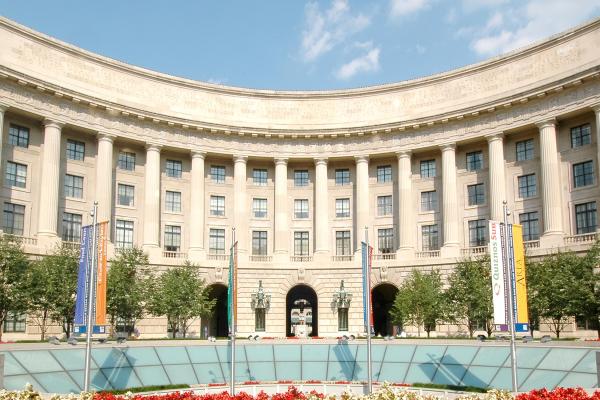Insights on Coronavirus (COVID-19) Task Force
422 total results. Page 1 of 17.
Whether we like it or not, COVID-19 continues to pose challenges for everyone. One way to help mitigate the risk of contracting the virus is getting fresh air.
On September 9, the White House announced Executive Order 14042, which requires covered federal contracts to include a clause mandating compliance with guidance that had yet to be issued by the Safer Federal Workforce Task Force (Task Force).
On January 13, the U.S. Supreme Court granted emergency relief to plaintiffs challenging OSHA’s COVID-19 Emergency Temporary Standard (ETS), and issued a stay on enforcement of the rule.
Last week, we reported on the District of Columbia’s newly-announced requirement that certain indoor facilities verify that patrons, ages 12 and over, are vaccinated against COVID-19. Here’s some additional information that you should know.
In November, with the pandemic apparently subsiding in DC, Mayor Muriel Bowser eased the City’s indoor mask mandate. On December 20, with COVID-19 cases again on the rise, Mayor Bowser declared a new state of emergency and reinstated the mask requirement.
On December 17, 2021, the U.S. Court of Appeals for the Sixth Circuit issued an Opinion lifting the stay of OSHA’s emergency temporary standard (ETS) requiring employers with 100 or more employees to implement mandatory COVID-19 vaccine or weekly testing policies for their employees.
On December 6, 2021, New York City Mayor Bill de Blasio announced a new COVID-19 vaccine mandate for all private sector employers that employ more than one employee in New York City.

A combination of high debt, low interest rates, and supply and labor shortages has contributed to inflation. Some of this impact is the direct result of the COVID pandemic. COVID has also caused distress in certain vulnerable sectors. It appears that inflation and COVID may be here to stay, at least
On December 6, 2021, New York City Mayor Bill De Blasio announced a new COVID-19 vaccine mandate for all private-sector employers who employ one or more employees in New York City.
Shifting standards and deadlines place additional burdens on contractors seeking to remain in compliance.
Headlines that Matter for Companies and Executives in Regulated Industries
On November 18, 2021, just a few days before the Omicron variant suddenly revealed itself to the world, the preliminary results of two Phase III clinical trials were announced by AstraZeneca, bringing new hope to high-risk populations.
Last week, the EEOC again updated its COVID-19 technical assistance; this time, to include more information about employer retaliation in pandemic-related employment situations.
We have reported on OSHA Emergency Temporary Standard (“ETS”), published on November 5th, that mandates that covered employers require their employees to be fully vaccinated against COVID-19 or obtain weekly COVID-19 tests and wear a facemask in the workplace.
On November 12, the Fifth Circuit extended its stay on OSHA’s COVID-19 vaccination and testing emergency temporary standard (ETS), which mandated that employers with 100 or more employees require their employees to get vaccinated or undergo weekly testing for COVID-19.
Due to the ongoing COVID-19 pandemic, Emergency Rules for filings, service, and statutes of limitation remain in effect in California state courts. While “temporary” rules first went into effect on April 6, 2020, many remain in place more than 18 months later.
On Friday, November 5, 2021, the Centers for Medicare and Medicaid Services (CMS) issued a comprehensive interim final rule, the Omnibus COVID-19 Health Care Staff Vaccination rule.

On November 4, 2021, CMS issued its Omnibus Staff Vaccination Rule, mandating that all Medicare and Medicaid-certified facilities regulated under Medicare health and safety standards require that their employees be fully vaccinated against COVID-19 by January 4, 2022.
On Thursday, November 4, the Occupational Safety and Health Administration (OSHA) published an emergency temporary standard (ETS) making good on President Biden’s pledge to require private employers with 100 or more employees to implement vaccination-or-testing mandates for their employees.

On November 4, 2021, the Occupational Safety and Health Administration (OSHA) issued its long-awaited emergency temporary standard (ETS) mandating that large employers require employees to be fully vaccinated against COVID-19 or obtain weekly tests and wear face coverings in the workplace.
Earlier this week, the EEOC updated its COVID-19 Technical Assistance.
On Monday, the U.S. Equal Employment Opportunity Commission (EEOC) updated its COVID guidance, “What You Should Know About COVID-19 and the ADA, the Rehabilitation Act, and Other EEO Laws,” to address religious objections to employer vaccine mandates.
The Biden Administration just announced that starting November 8, 2021 there will be stricter vaccine and COVID testing requirements for all air travelers into the US.
On October 13, 2021, the EEOC once again issued updated FAQs concerning the application of the Americans with Disabilities Act, Title VII of the Civil Rights Act of 1964, and the Genetic Information Nondiscrimination Act, among others, to issues arising out of the COVID-19 pandemic.
Large employers should soon have specific guidance on complying with the Occupational Safety and Health Administration (OSHA) vaccine and testing mandate.